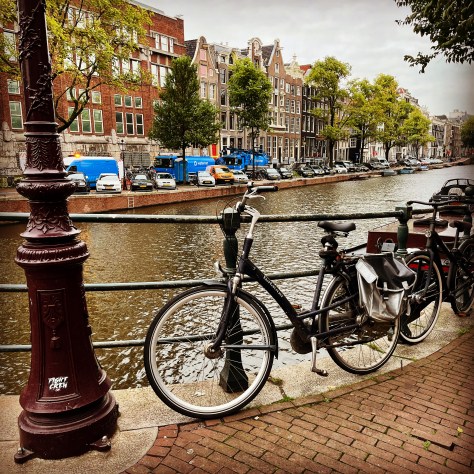
This week was all about Amsterdam, where I was attending the EDUTech conference at the Amsterdam RAI.
However, on Monday I was in our Bristol office. I had a planning catch up meeting about prospective communications and publications.
Tuesday I was off to Amsterdam. Having arrived and parked at Bristol Airport I had time for a coffee before boarding.

It was quite a quick flight, by the time we reached the Suffolk coast, we started our descent into Amsterdam. Having disembarked, I headed to passport control. There was a huge queue. Schiphol Airport had free WiFi, so I could use that in the airport whilst I had a long wait to get through passport control. Took over 90 minutes to get from the plane, through passport control, pick up my suitcase and then I could head to the railway station. It wasn’t long before I was at my hotel next to the RAI conference centre.

Following some issues with roaming in Spain in 2022 I have been a little concerned about travelling abroad and if I would have connectivity issues. However this time I had no issues.
The EDUTech Europe 2023 conference was over two days and covered a range of topics and subjects, but as you might have guessed AI was certainly up there being discussed across a range of sessions. As well as covering higher education, the conference also covers the schools sector, but the interactive programme made it very easy to filter out those sessions, so I could focus on the higher education topics.
I had been invited to participate in the Smart Campus panel session at EDUTech Europe 2023.
I had proposed that in the discussion I would chat about the following.
How do we move from a smart campus to a smarter or intelligent campus? Bringing in more data sources to get deeper insights and understanding.
What are the ethical and privacy considerations we need to be aware of before building a smart campus? Do we need to consider algorithmic bias in our planning?
A campus does not exist in isolation, how could we integrate the smart campus into the smart city (or smart community).
Across the rest of the day there were a range of sessions, I focused a lot on digital leadership. It was interesting to see the reliance on champions to deliver change. My own experience has shown that though champions can have an impact, generally the process of using enthusiasm to deliver effective change is inconsistent, and if you want to deliver holistic change across a whole organisation, then the use of enthusiastic champions generally won’t result in that change happening. Of course using champions as part of a portfolio of change levers, is certainly something that can work.
Thursday morning I attended HEAnet Group Advisory Forum via Teams. We discussed the HEAnet strategy as well as other topics related to technology and higher education in Ireland.

On Thursday I was invited to participate in the Assessment panel session at EDUTech Europe 2023, after someone had dropped out. This was an interesting session looking at the role of assessment.
Had a good discussion with a delegate from the University of Birmingham at the EDUTech Europe 2023, on various topics and issues. Have agreed to visit University of Birmingham.
Had an informative chat with a Principal Lecturer from Sheffield Hallam University on various topics and issues including smart campus and learning analytics.
Got some nice feedback from EDUTech Europe 2023:
I wanted to take a moment to express my sincere gratitude for your invaluable contribution as a speaker to EDUtech Europe 2023. Your expertise and insights added immense value to our event. The feedback we received from our attendees was overwhelmingly positive, and your knowledge and passion resonated with the audience. We look forward to the possibility of working with you again in the future.

On Friday I attended Jisc’s Research Evidence Advisory Group meeting. As we discussed research at Jisc I realised there were some key ways in which I interact with research. It started initially as three Cs, but by the end of the meeting this had grown to six.
Consumption – in my role I consume research by others, both internally and external research. Having access to that research is critical to the work I do.
Creation – I also create research, sometimes this is for projects, other times it has been for consultancy, and now and then for publication or for events.
Communication – It is important that research undertaken by Jisc is communicated internally and externally.
Community – I want to be part of the internal (to Jisc) research community, but also to be part of the external research community
Credibility – When we do research, it adds credibility to what we say and recommend. Having the evidence (gained from research) gives us the credibility we need when talking to the sector.
Co-ordination – It’s important to avoid duplication, or repetition; that we co-ordinate our activities.

Got some nice feedback from The Blended Learning in HE Conference I presented at last week.
I would like to thank you very much for speaking at The Blended Learning in HE Conference. We really appreciate the time and effort that you took in preparing to present at the event. Your address was well received by the delegates and the conference has already received some great feedback.
Did some initial organisation of Senior Education and Student Experience Group meetings, format and timings.
I spent much of the day travelling back from Amsterdam on Friday. Spent less time at passport control this time.







































